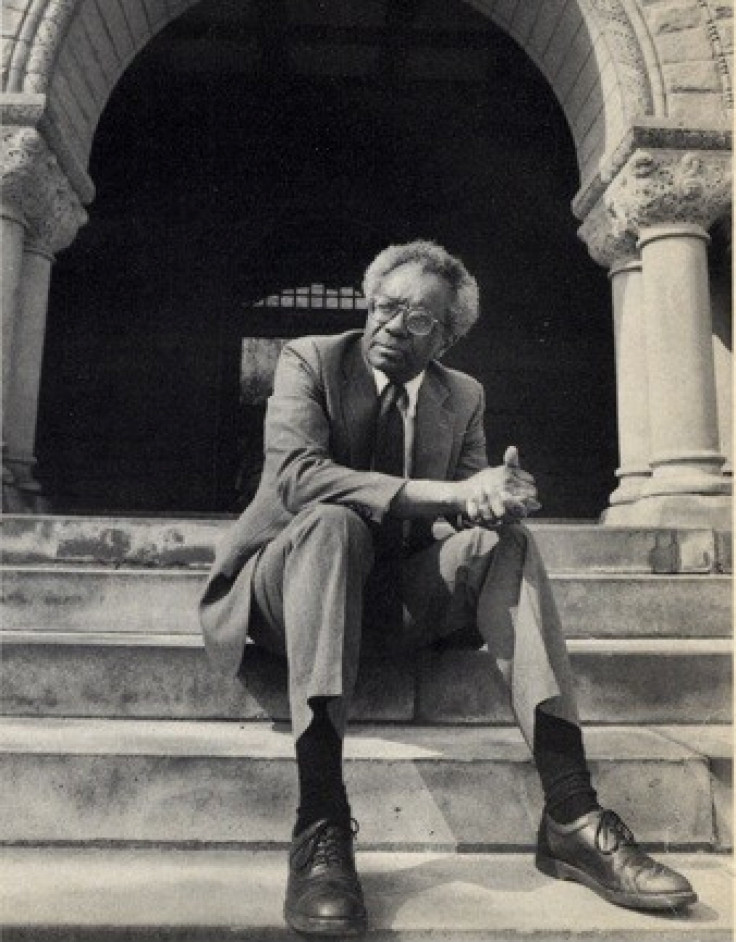Critical Race Theory: What Derrick Bell Taught, And What It Means Now
Analysis

Apparently, critical race theory is a tough nut to crack. Ever since the March 7 unveiling of a 1991 video that seems to ally President Obama with this divisive school of thought, the speculation has been nonstop.
The theory's late founder, Harvard law professor Derrick Bell, has been called an inspiring teacher and mentor as well as a raging, fulminating racist. The late Andrew Breitbart charged that Obama's predilection for racial division and class warfare stemmed from Bell's teachings. On Thursday, CNN news anchor Soledad O'Brien got into an on-air spat about the very meaning of the concept. Even the term's Wikipedia entry has undergone frequent changes over the last few days.
Dr. Theodora Regina Berry, president of the Critical Race Studies in Education Association (CRSEASSOC), offered a succinct definition of the concept. Critical race theory is really a framework that addresses the politics of race in the context of the law, she said. What we're looking at are the ways in which racial politics have either changed or maintained the status quo in American society.
In other words, this school of thought examines how laws meant to promote a fair society may actually reinforce inequality and preserve hierarchies. In the seminal 1973 publication Race, Racism and American Law, Bell explained that racism is a subtle yet powerful institutionalized force. His goal was to examine the law's role in concretizing racial differences, maintaining racial inequality, and reifying the status quo.
He challenged the assumed fairness of the American political system, arguing that true neutrality is impossible. Abstraction, put forth as 'rational' or 'objective' truth, [allows] the privileged to de-personify their claims and then pass them off as the universal authority and the universal good, wrote Bell in 1995. To address this, critical race theorists seek to empower and include traditionally excluded views.
As Berry explains it, There's a major tenet of critical race theory called anti-essentialism. What that really means is there's no one-size-fits-all answer to every kind of situation. In terms of policy, this means that we need to look at the multiple ways that people live to determine the kinds of things the government can do for them, based on where they live, who they are and how they're educated.
Bell was an independent and sometimes provocative thinker; he differed from many of his contemporaries in that he doubted the momentousness of many civil rights victories and even argued in 1992 that black people will never gain full equality in this country. Bell was not resigned; he simply advocated a more challenging and holistic approach to achieving equality.
It is our hope that scholarly resistance will lay the groundwork for wide-scale resistance, he wrote. We believe that standards and institutions created by and fortifying white power ought to be resisted.
Some of his critics saw this as dangerous language and accused Bell of pitting white and black Americans against each other. Joel B. Pollack, who argued with Soledad O'Brien on CNN on Thursday, called critical race theory a radical doctrine that holds that American legal institutions--including our civil rights laws--perpetuate white supremacy. Bell's ideas were not only radical, but bizarre.
Berry disagrees. White supremacy has nothing to do with critical race theory, she said. It is not embedded in the definition. Although Bell frequently referenced the fact that white Americans enjoyed systematic privileges in society, he also questioned the very nature of racial divisions, calling race a social construct and adding that critical race theorists see all-inclusiveness as the ideal because of our belief in collective wisdom.
Differing opinions on Bell and his ideas notwithstanding, the current debate comes down to one essential question: does Obama himself subscribe to critical race theory? Does a videotaped hug constitute an endorsement? And is there any evidence that critical race theory has influenced the president's policies over the past four years?
To be honest, no, said Berry. There doesn't seem to be any evidence that he is leaning strongly into that political camp.
Conservative columnist David French agrees, writing in The National Review that Obama has shifted gears since his college days. I would imagine that law school Barack Obama would never imagine ordering drone strikes on American citizens on foreign soil or Navy SEAL raids deep into Pakistan, said French. Law school Barack Obama would likely think Obamacare was a thoroughly unsatisfactory half-measure and oppose it bitterly. Law school Obama is not our president, and I'm not sure that the videos tell us much at all about the man who sits in the oval office.
On film in 1991, Obama embraced the founder of critical race theory. But in practice, he has never fully embraced the tenets. The president is a liberal politician, whereas Bell used to challenge liberalism for not going far enough.
What would adherence to critical race theory actually look like in politics? Even Bell would acknowledge that as a very difficult question. As to what critical race theory ought to be, he wrote, the answers are far from uniform and, not coincidentally, tend to be leveled in the form of outsider criticism rather than insider inquiry.
Although critical race theory is not cohesive, he added, it is at least committed.
© Copyright IBTimes 2024. All rights reserved.












